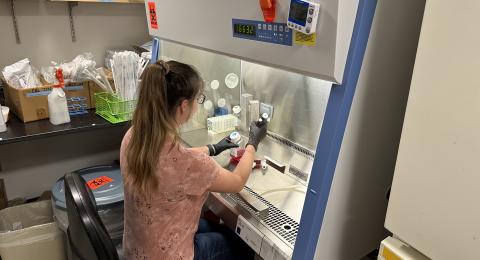Why get a master’s degree in genetics?
Recent innovations in the fields of genetics and genomics are driving new discoveries, and with an M.S. in genetics, you can contribute to the advancement of public and human health research, practice and policy. Our interdisciplinary genetics program covers areas from molecular and cellular biology to environmental and evolutionary genetics and genomics in microbial, plant and animal systems. You will be equipped for a successful career with biotechnology and pharmaceutical companies, agricultural organizations, or academic and government research laboratories. You will also be prepared for doctoral studies, medical school or health-related professional programs.
Why choose UNH for your degree?
At UNH, the M.S. in genetics is an interdisciplinary program made up of faculty from multiple departments and from the Hubbard Center for Genome Studies. You can participate in cutting-edge research in disease and cancer genetics, genomics and bioinformatics, biodiversity and molecular ecology, and transcriptional and translational regulation. UNH is ranked among the nation’s highest-performing research universities, having earned a Carnegie Classification R1. The university’s research portfolio brings in more than $110 million in competitive external funding each year.
Potential careers
- Biochemist
- Biotech consultant
- Epidemiologist
- Genetic counselor
- Health educator
- Lab manager
- Research scientist
Curriculum & Requirements
The M.S. in Genetics is an interdisciplinary program made up of faculty from multiple departments and from the Hubbard Center for Genome Studies. The Genetics Program integrates disciplines ranging from molecular and cellular biology to environmental and evolutionary genetics and genomics in microbial, plant, and animal systems. Graduates of the program are equipped for successful careers in biotechnology and pharmaceutical companies, academic and government research laboratories, and are prepared for doctoral programs, medical school, and health-related professional programs.
Distinctive Features of the Program
- Outstanding research training in many cutting-edge research areas in molecular and evolutionary genetics, genomics, and bioinformatics
- Emphasis on interdisciplinary research training
- Well-equipped research laboratories and core facilities on the UNH campus
- Laboratory rotations upon entry to the program to become familiar with different research laboratories
- Weekly graduate student seminar presentations, as well as a departmental seminar series of invited speakers
- Opportunities to gain teaching experiences as a Graduate Teaching Assistant
Research Opportunities
- Genomics and bioinformatics
- Evolutionary genomics
- Microbial ecology and genomics
- Plant genomics
- Biodiversity and molecular ecology
- Cancer genetics
Financial Support
- Students admitted to the M.S. Program are typically supported by Research Assistantships or Teaching Assistantships
- Intramural summer and academic year fellowships are available to students on a competitive basis.
- Teaching Assistantships are not available for students enrolled in the Accelerated M.S. program
Career Prospects
- Research scientists in biotechnology and pharmaceutical industries
- Lab managers in academic research labs and research institutes or state and federal government agencies
- Academic preparation for doctoral programs and professional health programs (e.g., medical school)
Admission Requirements
- Completion of foundational courses in biology, chemistry (including organic chemistry), physics, and mathematics
- Otherwise well-qualified applicants can correct academic deficiencies with enrollment in appropriate courses or independent study during the first year of graduate studies
- Applicants from non-English speaking countries must provide Test of English as a Foreign Language (TOEFL) scores
- Three letters of recommendation
- Personal statement, including research interests and names of two or three potential Genetics faculty thesis advisors.
Degree Requirements
The coursework for the Master of Science degree is formulated with input from the student's guidance committee. Students admitted to the M.S. program are required to conduct a research project under the guidance of a faculty adviser, write and submit a thesis based on this research, and pass an oral examination covering graduate courses and thesis.
Students must take a minimum of 30 credits, including at least three genetics courses (minimum of 10 credits), preferably covering the breadth of genetics, attend MCBS 997 Seminar each semester, present one seminar per year, and write and defend a 6-10 credit thesis (MCBS 899 Master's Thesis) before their guidance committee.
Program Learning Outcomes
All MCBS graduates will be able to:
- Critically apply theories, methodologies, and knowledge to address fundamental questions in their primary area of study.
- Pursue research of significance in the discipline (or an interdisciplinary or creative project). Students plan and conduct this research (or implement their project) under the guidance of an advisor, while developing intellectual independence that typifies true scholarship.
- Demonstrate skills in oral and written communication sufficient to present and publish work in their field, and to prepare grant proposals.
- Follow the principles of ethics in their field, and in academia.
- Demonstrate, through service, the value of their discipline to the academy and community at large.
- Demonstrate a mastery of skills and knowledge at a level required for college and university undergraduate teaching in their discipline and assessment of student learning.
- Interact productively with individuals from diverse backgrounds in the roles of team members, leaders and mentors with integrity and professionalism.
Graduates of the Genetics M.S. degree program will be able to:
- Describe general concepts of genetics.
- Demonstrate the ability to design, execute, and analyze research in their area of specialization within genetics.
- Critically evaluate and form conclusions based on genetic or genomic data.
Deadlines
Applications must be completed by the following deadlines in order to be reviewed for admission:
- Fall: December 15 (priority), April 15 (final) - Applications completed by December 15 will be given priority consideration for admission and financial support with an assistantship. Applications completed after December 15 will be considered based on openings and funding. Applications are accepted until April 15, the final deadline.
- Spring: September 15 (priority), October 15 (final) - Applications completed by September 15 will be given priority consideration for admission and financial support with an assistantship (applications are accepted until October 15, the final deadline). Please note that most assistantships are awarded for Fall admission; however, assistantships may be available for Spring admission based on funding availability. Students can contact the department before applying to get up-to-date information on the availability of financial support.
- Summer: N/A
- Special: N/A
Application fee: $65
Campus: Durham
New England Regional: ME
Accelerated Masters: Yes (for more details see the accelerated masters information page)
New Hampshire Residents
Students claiming in-state residency must also submit a Proof of Residence Form. This form is not required to complete your application, but you will need to submit it after you are offered admission, or you will not be able to register for classes.
Transcripts
If you attended UNH or Granite State College (GSC) after September 1, 1991, and have indicated so on your online application, we will retrieve your transcript internally; this includes UNH-Durham, UNH-Manchester, UNH Non-Degree work and GSC.
If you did not attend UNH, or attended prior to September 1, 1991, then you must upload a copy (PDF) of your transcript in the application form. International transcripts must be translated into English.
If admitted, you must then request an official transcript be sent directly to our office from the Registrar's Office of each college/university attended. We accept transcripts both electronically and in hard copy:
- Electronic Transcripts: Please have your institution send the transcript directly to grad.school@unh.edu. Please note that we can only accept copies sent directly from the institution.
- Paper Transcripts: Please send hard copies of transcripts to: UNH Graduate School, Thompson Hall- 105 Main Street, Durham, NH 03824. You may request transcripts be sent to us directly from the institution or you may send them yourself as long as they remain sealed in the original university envelope.
Transcripts from all previous post-secondary institutions must be submitted and applicants must disclose any previous academic or disciplinary sanctions that resulted in their temporary or permanent separation from a previous post-secondary institution. If it is found that previous academic or disciplinary separations were not disclosed, applicants may face denial and admitted students may face dismissal from their academic program.
Letters of recommendation: 3 required
Recommendation letters submitted by relatives or friends, as well as letters older than one year, will not be accepted.
Personal Statement/Essay Questions
Prepare a brief but careful statement that includes the following: 1) the reasons you wish to do graduate work in this field, including your immediate and long-range objectives, 2) your specific research or professional interest and experiences in this field, and 3) a review of MCBS graduate program faculty research descriptions and the identification by name of two or three potential mentors for your graduate studies.
Statements must be included with your submitted application.
Additional Department Requirements
Please note the GRE is no longer required. No GRE score is needed to apply.
Important Notes
All applicants are encouraged to contact programs directly to discuss program-specific application questions.
International Applicants
Prospective international students are required to submit TOEFL, IELTS, or equivalent examination scores. English Language Exams may be waived if English is your first language. If you wish to request a waiver, then please visit our Test Scores webpage for more information.





















